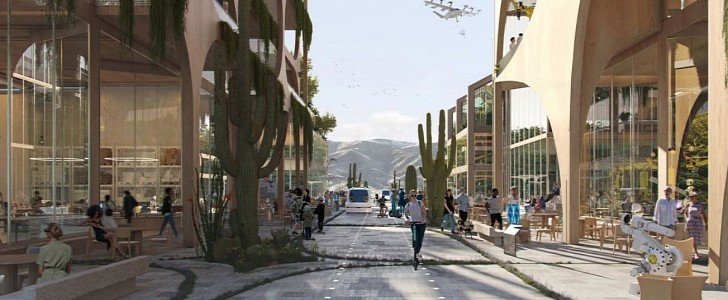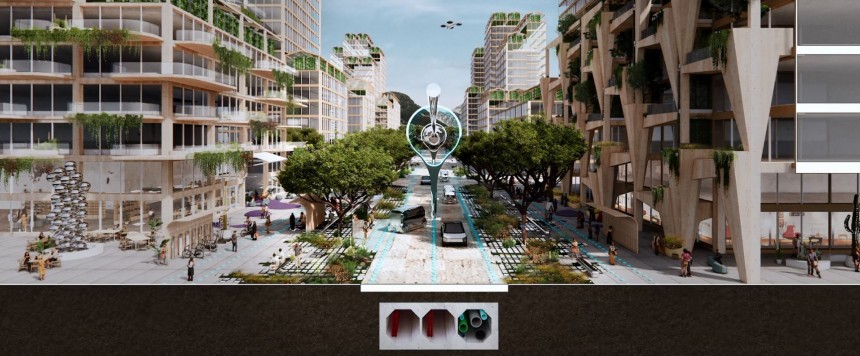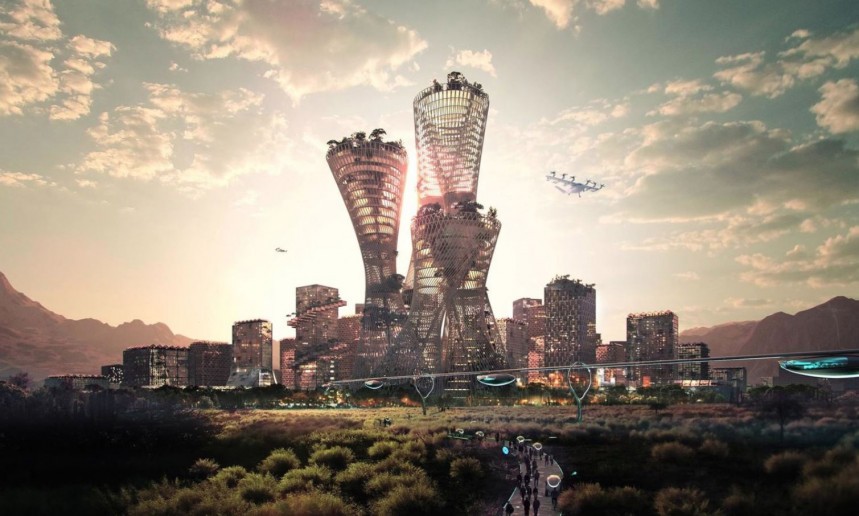Today’s cities are overcrowded, over-populated and increasingly unsafe. Housing is tricky, healthcare is scarce, pollution is on the rise, and economic disparity is rampant. So how do we solve all these?
We start from scratch, that’s how we do it. Serial entrepreneur and billionaire Marc Lore has an idea that, he says, will pave the way for future generations by laying out the blueprint for the society of tomorrow: a city built from scratch that’s sustainable and fair, inclusive and versatile, open and welcoming, right in the heart of the United States. He calls it Telosa and, why yes, it’s also car-free.
Telosa was unveiled to the world at the beginning of the month, with plans to welcome the first residents by 2030. Initial renderings by Bjarke Ingels Group (BIG) have also been made public, and they show a utopian-looking city flush with greenery and open spaces, clean air, autonomous vehicles and eVTOLs. But, before we proceed, Telosa might be a lot of things, but a utopia it is not.
“We are absolutely not attempting to create a utopia,” Lore says. “Utopian projects are focused on creating a perfect, idealistic state – we are not. We are firmly grounded in reality and what is possible. We are focused on the best, most sustainable solutions for infrastructure, urban design, economic vibrancy and city services, but we fully recognize that no solution is perfect and all human systems have flaws.”
Telosa will try to tackle most issues encountered in large U.S. cities today, from congestion and pollution, to sustainability, widely accessible healthcare, affordable housing, and equal opportunities for all. Lore bases it on a concept he calls Equitism, which is the opposite of capitalism. Equitism is defined as inclusive growth: instead of letting the market decide, it puts man back in the focus. Everyone has a stake in the city, so if the city flourishes, so do its residents. This would make Telosa the most inclusive, “most fair” city in the world, one in which government was completely transparent and no one was left out or behind.
Aside from the social aspect, Telosa would come with a heavy focus on sustainability. This would be a city with no cars, and you’d be excused if you noted with a sense of bitterness that forward-looking developers are perhaps too focused on abolishing the car as we know it. Lore still allows for some vehicular traffic in the center of Telosa, but makes it very clear from the start: the city would belong to pedestrians and cyclists. At most, there would be “slow-moving” autonomous vehicles, as well as an underground system of trains or other type of public transport.
Lore doesn’t “have it in for” the car just for the heck of it. His city simply doesn’t have room and purpose for it: everything will be within a 15-minute walking distance. Goodbye, long and tedious daily work commute, hello, more personal time! For everything else, there would be e-bikes, the autonomous pods, the underground public transport, and flying taxis, or what we call today eVTOLs. Telosa would be zero carbon from the get-go.
Telosa would reuse and recirculate water, collect rainwater, use solar panels, have aeroponic gardens for fresh produce, and use technology to cut down on waste and maximize the use of all available resources. The “beacon” of the city will be the so-called Equitism Tower, which stands in the center.
Speaking of land, Lore says this is where Telosa will be most innovative. The city will be built on a piece of land that will be donated to a community endowment. The community endowment will manage all income generated by and on the land, directing funds towards education, city services, healthcare and housing, without raising taxes.
For the time being, Telosa is just a plan, but Lore is convinced it will be able to welcome new residents by 2030. As noted above, the city will be built in the U.S., with the shortlist of possible locations including Utah, Nevada, Idaho, Arizona, Texas, and the Appalachian Region. The estimated cost of the entire city is of about $400 billion, funded by investors, government backing and subsidies, and any American citizen who wishes to move in will be welcome to.
The plan is to complete the construction in stages, with the first part housing 50,000 residents across a comparatively smaller area and a price tag of “just” $25 billion. Ultimately, Telosa should become home to about 5 million residents, but the density of the population won’t be bigger than what we have today in San Francisco.
Telosa was unveiled to the world at the beginning of the month, with plans to welcome the first residents by 2030. Initial renderings by Bjarke Ingels Group (BIG) have also been made public, and they show a utopian-looking city flush with greenery and open spaces, clean air, autonomous vehicles and eVTOLs. But, before we proceed, Telosa might be a lot of things, but a utopia it is not.
“We are absolutely not attempting to create a utopia,” Lore says. “Utopian projects are focused on creating a perfect, idealistic state – we are not. We are firmly grounded in reality and what is possible. We are focused on the best, most sustainable solutions for infrastructure, urban design, economic vibrancy and city services, but we fully recognize that no solution is perfect and all human systems have flaws.”
Aside from the social aspect, Telosa would come with a heavy focus on sustainability. This would be a city with no cars, and you’d be excused if you noted with a sense of bitterness that forward-looking developers are perhaps too focused on abolishing the car as we know it. Lore still allows for some vehicular traffic in the center of Telosa, but makes it very clear from the start: the city would belong to pedestrians and cyclists. At most, there would be “slow-moving” autonomous vehicles, as well as an underground system of trains or other type of public transport.
Lore doesn’t “have it in for” the car just for the heck of it. His city simply doesn’t have room and purpose for it: everything will be within a 15-minute walking distance. Goodbye, long and tedious daily work commute, hello, more personal time! For everything else, there would be e-bikes, the autonomous pods, the underground public transport, and flying taxis, or what we call today eVTOLs. Telosa would be zero carbon from the get-go.
Telosa would reuse and recirculate water, collect rainwater, use solar panels, have aeroponic gardens for fresh produce, and use technology to cut down on waste and maximize the use of all available resources. The “beacon” of the city will be the so-called Equitism Tower, which stands in the center.
For the time being, Telosa is just a plan, but Lore is convinced it will be able to welcome new residents by 2030. As noted above, the city will be built in the U.S., with the shortlist of possible locations including Utah, Nevada, Idaho, Arizona, Texas, and the Appalachian Region. The estimated cost of the entire city is of about $400 billion, funded by investors, government backing and subsidies, and any American citizen who wishes to move in will be welcome to.
The plan is to complete the construction in stages, with the first part housing 50,000 residents across a comparatively smaller area and a price tag of “just” $25 billion. Ultimately, Telosa should become home to about 5 million residents, but the density of the population won’t be bigger than what we have today in San Francisco.
— Marc Lore (@MarcLore) September 1, 2021












